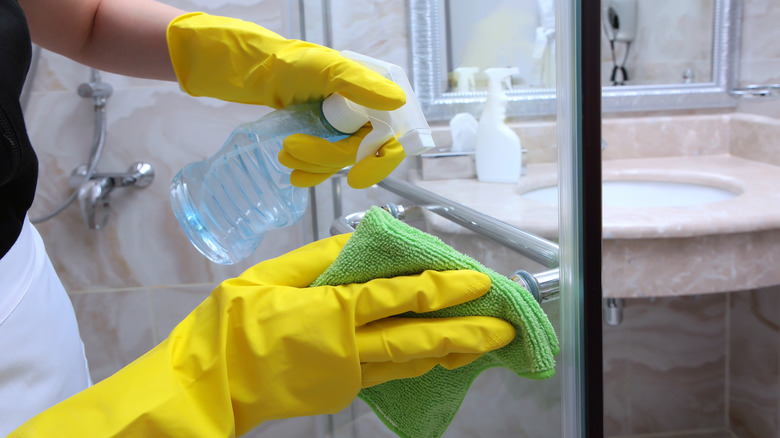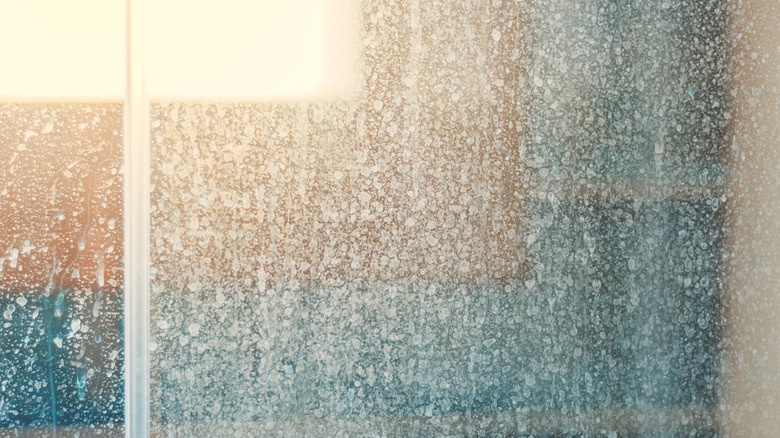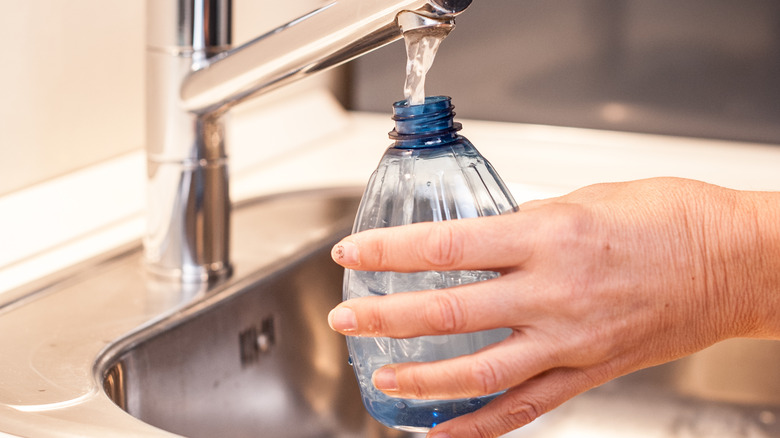Windex Isn't The Best Solution For Cleaning Shower Doors - Here's Why
When it comes to keeping our shower doors clean, many of us reach for a bottle of the blue stuff, aka, Windex. It's a cleaner and glass polisher that leaves a streak-free shine on just about any finish. But it actually isn't the right choice when it comes to cleaning your shower.
Windex is ammonia-based, which is why it's able to power through so many stubborn stains, like greasy makeup marks on the bathroom mirror. In addition to that cleaning power, ammonia evaporates extremely quickly, leaving behind a streak-free finish. And while that pungent fragrance of ammonia doesn't last long, the effects of the chemical itself don't stop immediately when used in the shower. Instead, the ammonia in left-behind Windex begins eating away at the surrounding elements in your shower, like its metal finishes or the grout between tiles. So while your shower door may be streak-free, the rest of your shower is susceptible to damage.
Additionally, Windex isn't actually all that great at breaking down limescale or other hard water stains, as ammonia is better against greasy stains, rather than the mineral-based buildup of water stains.
Will ammonia-free Windex work?
Ammonia-free Windex is often offered as an alternative to regular Windex. But is it better for your shower door? It essentially swaps ammonia out for other fast-evaporating chemicals such as alcohol-based isopropanolamine. And just like ammonia, this stuff is great at cleaning away oil-based stains and buildup. Because it drops the ammonia, it is safer for your other shower fixtures. But there's little to suggest this formula is effective against hard water stains, which typically require an acidic solution to break down.
However, if you are determined to use part of the Windex cleaning suite, you may still be in luck. Windex has released an ammonia-free, vinegar-based formula that's a solid choice for cleaning and polishing shower doors. Vinegar is a highly-acidic cleaning agent, while ammonia is basic. Acids can break down the hard minerals found in water stains, so this formula is actually able to wipe out limescale and mineral build-up.
It should be noted that just as you shouldn't mix ammonia and bleach, you also shouldn't mix vinegar and bleach, as they can create chlorine gas. If you use both chemicals in your bathroom cleaning routine, allow several hours between applying to prevent any issues.
Alternative ammonia-free cleaners
Just as the vinegar-based Windex solution is well-suited to cleaning your shower doors, so is plain white vinegar, and you probably already have a bottle of it in your home. Just mix equal parts white vinegar and water into a spray bottle, spritz onto your shower doors, and then wipe away with a microfiber cloth. If you have nasty hard water buildup, allow the vinegar mixture to sit on the surface for a few minutes before wiping off, and reapply as needed. While vinegar is a natural cleaner, it leaves behind a distinct odor that may not be your favorite, so consider adding some lemon juice to give it a more pleasant scent.
There are still plenty of Windex alternatives that won't leave your house smelling like a pickle jar. ScrubDaddy's Power Paste and Bar Keepers Friend are also effective against limescale on shower doors. Both use abrasives that gently break down the physical properties of the mineral buildup, and also use either oxalic acid (Bar Keepers Friend) or soap and surfactants (ScrubDaddy's Power Paste). In the end, both do a fantastic job at clearing away hard water stains on your shower door.


